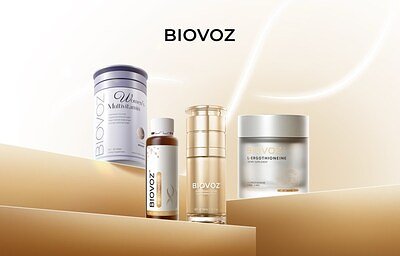
NZ Firm Biovoz Targets Genetic Skincare with University of Auckland Partnership
Biovoz is partnering with the University of Auckland to develop skincare that moves beyond surface-level treatments, aiming to influence skin health at the genetic level. Can this approach unlock the future of anti-aging?
NZ Firm Biovoz Targets Genetic Skincare with University of Auckland Partnership
NEW YORK, NY – November 19, 2025
A New Approach to Anti-Aging
New Zealand-based skincare company, Biovoz, is making waves in the beauty tech space through a research partnership with the University of Auckland. This collaboration isn't focused on traditional topical treatments, but rather on the potential of influencing skin health at the genetic level. The company’s ambition is to move beyond addressing the symptoms of aging and focus on intervening in the underlying biological processes.
Biovoz positions itself as a “Science Meets Nature” brand, combining natural ingredients with biotechnology. The partnership leverages the expertise of Professor Jun Lu, a highly-regarded researcher at the University of Auckland’s Auckland Bioengineering Institute, who now serves as Biovoz’s Chief Scientific Advisor. Professor Lu’s extensive publication record, spanning areas from food for health to cardiovascular function, lends significant credibility to the endeavor.
“The concept of truly personalized skincare, tailored not just to skin type but to an individual’s genetic makeup, is gaining traction,” notes an industry analyst. “Companies that can demonstrate scientific validity and deliver measurable results will be well-positioned in this evolving market.”
Delving into “Gene Technology”
Biovoz’s core strategy centers around a technology branded “Melan-erase™,” described as a “Nobel Prize-inspired gene technology” inhibiting melanin formation at the dermal layer. The company markets products like the Bright Diamond Drink and Clearly Brightening Serum, built around this core technology. While the specifics of Melan-erase™ remain proprietary, the stated goal is to regulate melanin production at its source, offering a more effective approach to skin brightening and evenness.
However, the claim of being “Nobel Prize-inspired” requires careful consideration. Biovoz has not publicly specified which Nobel Prize underpins this technology. Several potential connections exist, ranging from discoveries related to DNA repair mechanisms (relevant to aging and skin damage) to breakthroughs in understanding cellular signaling pathways. Without further clarification, the connection remains somewhat ambiguous.
“It's common for companies to invoke the prestige of the Nobel Prize, but it’s crucial to scrutinize the scientific basis of such claims,” says a dermatologist unaffiliated with the partnership. “The key question is whether the technology genuinely represents a novel application of Nobel-winning science or simply a marketing tactic.”
A Crowded and Competitive Landscape
The anti-aging and personalized skincare markets are experiencing rapid growth, fueled by increasing consumer demand for effective and tailored solutions. The global anti-aging market is projected to reach nearly $94 billion by 2033, while the personalized skincare segment is anticipated to exceed $66 billion in the same period. This growth is driven by factors such as rising disposable incomes, increased awareness of anti-aging products, and advancements in scientific understanding of skin biology.
Competition within these markets is fierce. Numerous companies are vying for market share, employing a range of strategies from traditional topical formulations to advanced technologies such as genetic testing and AI-powered analysis. Players like Proven Skincare and Geneu are leading the charge in personalized skincare, offering customized formulations based on individual DNA profiles and skin concerns.
“The market is becoming increasingly crowded, and consumers are becoming more discerning,” explains a market analyst specializing in the beauty tech sector. “Companies that can demonstrate a genuine scientific advantage and deliver visible results will be the ones that thrive.”
Biovoz is attempting to differentiate itself through its focus on gene regulation and its partnership with a leading academic institution. By collaborating with Professor Lu and the University of Auckland, the company aims to establish scientific credibility and accelerate the development of innovative skincare solutions. However, it faces the challenge of translating complex scientific concepts into compelling consumer products and effectively communicating its unique value proposition in a competitive market.
The company’s success will ultimately depend on its ability to demonstrate the efficacy of Melan-erase™ through rigorous clinical trials and establish a strong brand reputation built on scientific integrity and demonstrable results. While the promise of genetically-targeted skincare is appealing, the path to market is fraught with challenges, requiring a sustained commitment to research, innovation, and consumer education.
